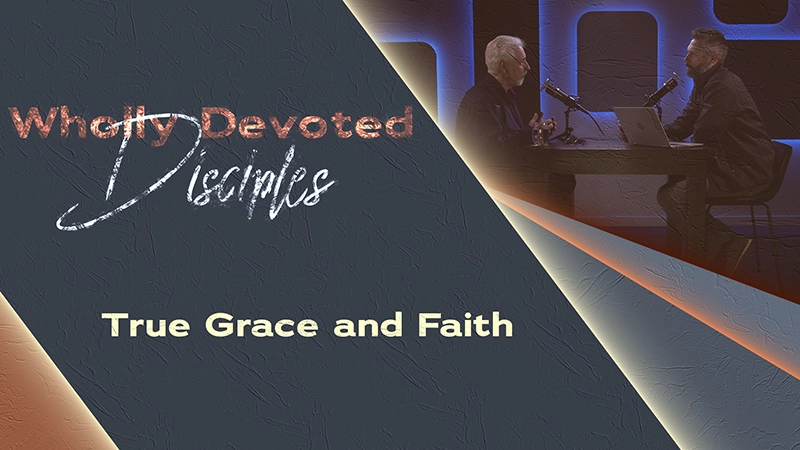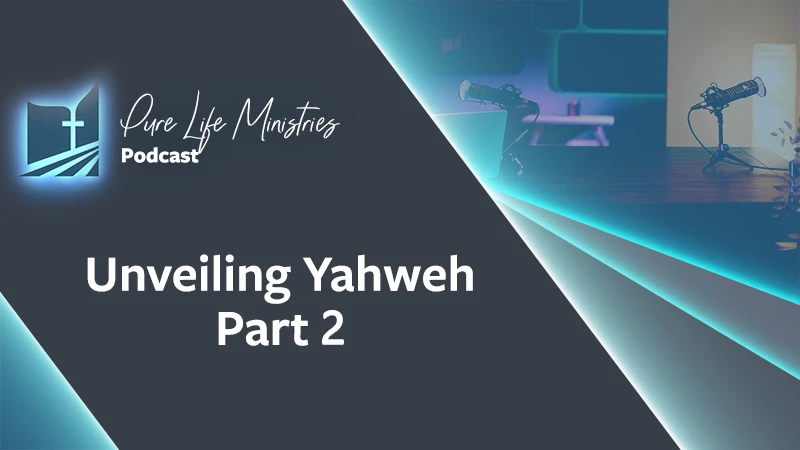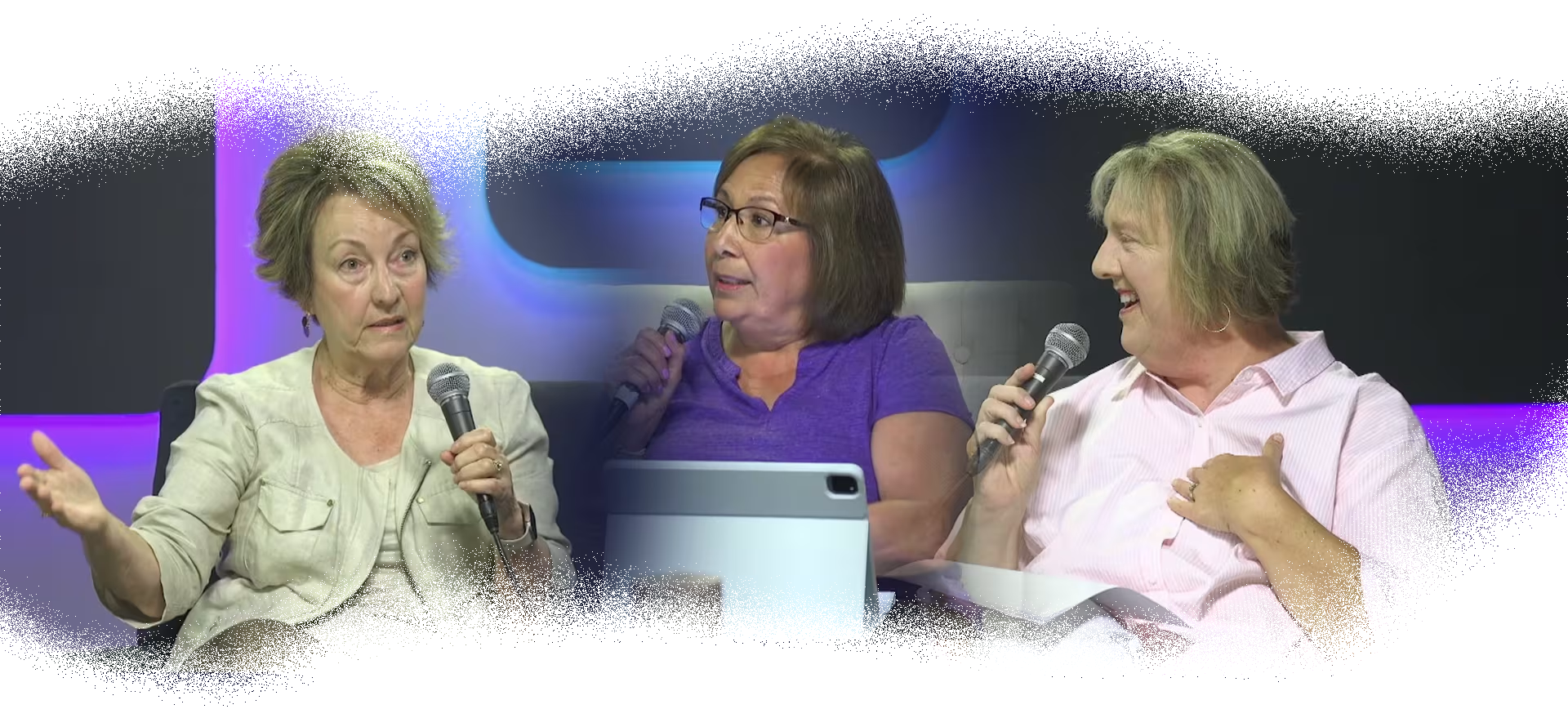
A New Way to See People
In this segment, Pastor Ed Buch teaches how we can learn to freely pour out love to others with a heart of mercy. He helps us see the beauty and joy of living a life free from selfish motives. (from Podcast Episode #452 - |Victory| A Life Overflowing with Mercy)
Nate: Pastor Ed, what we want do in this interview is give people some really practical instruction about becoming a vessel of mercy. When you think about it, a heart of mercy toward other people is the opposite of being in lust toward them. Lust is all about taking; mercy is all about giving. It's selfless. So really a person who's repenting of a life of lust is saying, “I'm going to start seeing people differently and I'm going to start treating them differently.” I want start off identifying some of the sinful ways that we can view others, and then some of the godly ways. What are some of the ways that our sinful flesh causes us to see people?
Pastor Ed: Well Nate, unless the Lord has really helped us change the way we naturally view or categorize other people, it boils down to two extremes: we either see people as leeches or donors. Of course, we would never allow ourselves to use those words for it, but that's what we are saying in our hearts. We see this leech, this person who is trying to feed off us in some way. We may think they're taking advantage of our resources or abilities in some way that ends up giving them a greater benefit than we receive from them. There are some worst-case examples where a leech type person will just drain us completely of our energy, our time, or our finances. They somehow just end up sucking the life out of us. On the other side, there's the donors that we see as people who are going to make a contribution of some sort into our life.
These ways of viewing others can take different forms, and some of them get into sin like you mentioned. The sinful ways manifest themselves because we're looking to others to satisfy our desires. In our culture, sexual lust is unquestionably one of the most prevalent desires that we're looking for others to satisfy. Even if it's not a physical relationship, we're feeding our mental fantasy life, but it could even be a lot more subtle than that. We use other people and expect them to help satisfy our desires for attention, acceptance, security, or emotional wants. We would like other people to take care of us emotionally usually, but it could also be financially or spiritually, and all these thoughts can just drift us into a sinful way of thinking and acting.
We also can want people around us that we can use as scapegoats, somebody to blame our problems and difficulties on. We might even see people as part of our calling somehow, as if we feel this need to be invested in people's lives, to counsel them or fix their problems. And in a strange way, we then see them as a key to our fulfillment or satisfaction. The bottom line is that the net result of our relationship is a gain for ourselves personally. That’s what I mean by these people being donors. The simple way to say it is, there are givers and takers in our lives and we're always trying to manipulate our takers into becoming givers to us. Nate I think the real problem is that when we look at other people, we have ourselves at the center and everybody else revolving in orbit around us. Unless the Lord steps in and changes our perspective, we're always going to tend to see people in terms of how they either benefit us or fail to benefit us.
Nate: Wow. Okay, well the knife goes in a little deep when you talk about things like that. As you're talking, I think the thing that was striking me is how subtle these things are, because I'm not sure that any of us ever plan on being that way. It’s just that we've got this impulse that says “I need”, and then we subconsciously look for somebody that we think can meet that need. And then when someone begins to act in a way where we think they’re taking from us, we panic. We're just reacting and acting out of impulse, rather than consciously thinking along those lines.
Pastor Ed: That's exactly right Nate. This is what comes naturally to us. This is our default. It's what we we're born into. Unless God steps in and changes that, it will continue. But can I tell you that God sees people very differently than that? He's not looking for leeches and donors in people. He's not afraid to have us take from Him. Scripture says it straight out: it's His good pleasure to give us the Kingdom. He's not worried about us taking something from Him. He isn't trying to extract contributions from us either. He doesn't have any needs that you and I could possibly fulfill for Him.
The Bible says that you and I are the apple of God's eye. He inscribes our name on the palm of His hands, He broods over us with a jealous yearning love. He delights to give good gifts to His Children. When the Lord thinks of people, He yearns for communion, a heart-to-heart fellowship with us. And even that is for our sake, not His sake. God's focus is always on supplying our needs. He wants what's best for us. So when He looks at us, that's what He sees. He sees our needs and sees them much more clearly and accurately than we could ever see them ourselves, and then He looks to meet those needs for us.
He truly delights in going above and beyond in meeting our needs. He gives us a super abundant, overflowing supply of mercy, or a flood of mercy as we like to say here at Pure Life. And the thing that really delights His heart most is when we join Him and start looking at others the same way He does, and when we start looking for ways that we can be that vessel of His mercy to meet someone else's need.
We have a guy that we sometimes quote, his name is Rex Andrews. He’s a man who really studied what the Bible teaches about mercy, and he came up with this definition of Biblical mercy and it's a little lengthy, but man every time I read it, it just grips me with insight. He said:
Mercy is God's supply system for every need, everywhere.
Mercy is that kindness, that compassion and tenderness, which is a passion to suffer with or enter into another's ill’s or evil’s, in order to relieve, heal, and restore.
Mercy accepts another freely and gladly as he is, and supplies the needed good of life, to build up and bring to peace, and keep in peace.
Mercy is to take another into one's heart just as he is and cherish and nurture him there.
Mercy takes another’s sins, evils, and faults as its own, and frees the other by bearing them to God.
This is the glow of love.
That is the mercy God sent Jesus to reveal to us, and that's how God sees people.
Nate: Wow, what a contrast between the two things you talked about: how we are in our natural state and how God is in His natural state. There's no effort on His part to be like that, which is amazing and just highlights how much we need Him. We're not going to be like that without Him.
Pastor Ed: Yeah, we'll never conjure that up within ourselves, it must come through him.
Nate: One of the things that we touched on in our Living in Victory series was how when a person's repenting of sexual sin, they can bring that self-centeredness into the repentance process. When they do that, their purity, progress, and spiritual need become the center focus of everything and they’re forgetting about other people still. It’s really just a new hidden motive, and I think that it's easy to get imbalanced in that way. I'd like you to talk a little bit more about that so that people can avoid that trap.
Pastor Ed: Sure, and you're absolutely right. That is a danger we all have to guard against, and I think the problem is that we're trying to eliminate sin and develop a pure heart, but we're doing it while we're still at the center. So, we have to get ourselves out of the center. Jesus is preeminent, He must become the one who's at the center. Then with Him there, I can prefer him and others ahead of myself. I think we would do well to remember what Jesus said about the two greatest commandments. The greatest is to love God with all of our heart, mind, soul, and strength, in other words, with all of our being. The second is to love our neighbor as ourselves.
I was taught somewhere along the line, I think as a student going through the Residential Program at Pure Life, that love in its simplest terms, is giving of oneself. If we think about that in prioritizing our loving God and loving others, then I'm prioritizing giving myself away to meet other’s needs. It becomes the fulfillment of what Paul even wrote about in Romans 13:8-10 where he basically says that if we are pouring ourselves out to love others, we’re fulfilling the whole law and keeping all the commandments.
Nate: What about the person who says, “But when I try to give, I just see how selfish I still am”?
Pastor Ed: We're not going to nail this the first time out of the gate, right? I can remember my own situation and feeling that way, almost like there's this gushing out of my heart and it's mostly still polluted water coming out. But it was like the Lord was showing me there was a silver thread of Him in there that was coming out, or a thread of purity that was actually Him, and in time that became the predominant flow. The other is still there because we're human and we struggle, but the Lord is winning.
Nate: Amen, that's awesome. Just so that people are encouraged, I want to say don't quit. One passage that is really helpful is Isaiah 58. We see God's saying, if you would set other people free, if you would work to free them from wickedness, if you would work to see the oppressed loose from their bondage, if you would share your bread with the hungry, then your light is going to break forth. Your righteousness is going to come forth speedily. It's just interesting, it's like God is saying if you'll take care of others, I will take care of you. I've heard you talk a lot about this, and I just want you to encourage our listeners with some of the things that God has made real to you about this.
Pastor Ed: Yeah, I'm sure there are probably even other places in Scripture that go hand in hand with the passage you mentioned in Isaiah 58 that kind of reveals that God will take care of us as we're taking care of others. We don't really need to make that a place of our focus personally, but for me it really happened simply and in a straightforward manner. I was going through the Beatitudes there in Matthew 5. The fifth Beatitude says, “Blessed are the merciful for they shall obtain mercy.” The Lord just opened that up to me and showed me that I really didn't need to be focused on my needs. If I made it a point and a commitment to meeting the needs of others, to being merciful, then I could trust God to meet my needs. That's what would be the natural, inevitable outcome of me meeting the needs of others, that God would take care of mine.

Nate: That’s one of those things that I think you just have to experience to understand it completely. So, really you just have to practice, and then you'll find that it’s true, rather than just having it as a concept that you read about.
Pastor Ed: That's right, just focus on meeting the needs of others, look for needs in other people's lives. And let me just add there, maybe people feel like, they know what others’ needs are. Well, you can always pray for them. Everybody needs someone to undertake for them in prayer for the Lord to make them to know Jesus more, for God to meet their spiritual needs. You can pray all sorts of things, but that's just a starting point.
Nate: I want to keep talking about this, because our culture is constantly feeding us the lie that the way to real happiness is to accumulate stuff for yourself. But I don't really want to spend a lot of time focusing on the lies, because we're trusting that the people who are listening today are really repenting, and they want to leave that life of selfishness behind. Can you just give them some more encouragement?
Pastor Ed: It is amazing really that we all still fall for the lie that the world presents to us, because to some degree, we have surely all experienced the emptiness of living for ourselves. We end up frustrated or empty, and the more we gain, the less we're satisfied. We never feel like we have enough. Our happiness is always fleeting, because it's just a shallow feeling that's derived from favorable circumstances that turn out to be temporary. But the mercy life that God brings us into is the antidote for all of that malaise, all of that discontentment, depression and anxiety that is rooted in living for self.
Jesus taught us very simply that it is more blessed to give than to receive. That's of course the opposite of what the world's been teaching us, but for those who enter into the mercy life, and for those who are willing to lay down their lives, to set aside their personal wants, desires, or priorities and pour out their lives to meet the needs of others, there is a union with God. There is a sense of being joined with Him and we are entered into the flow of God's heart toward other people. It is beyond words to describe how satisfying and fulfilling that is. There is an abiding joy that comes with that kind of life that nothing in this world can disrupt or take it away. You become truly alive inside for a change, and able to endure hardships or self-denial because we're now doing what God designed and created us to do and that trumps everything.

















